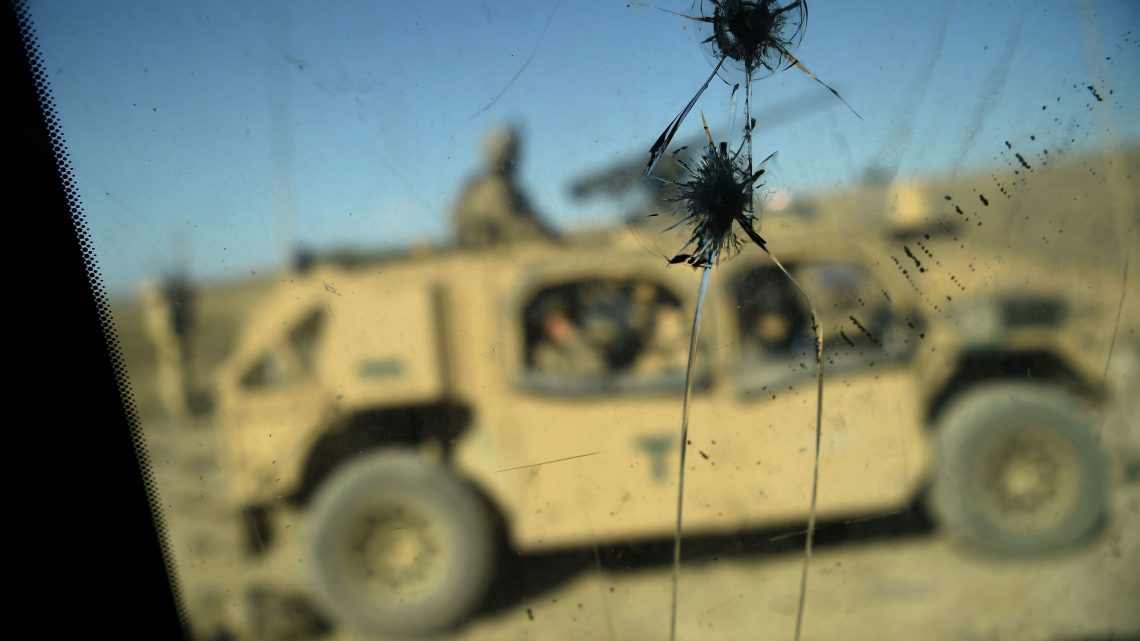
The Distinctly American Privilege of Forgetting War Exists
January 8, 2020In the 100-odd hours following the killing of Qassem Soleimani by a U.S. drone, the world seemed to enter a queasy state of flux. Iranians threatened retaliation for the assassination of one of their most notorious military leaders, and subsequently launched missile attacks on bases in Iraq housing U.S. troops; at the same time Donald Trump celebrated Soleimani's death in campaign ads and Democrats warned that we could be on the path to full-on war. Americans were left with the sense that anything could happen, a fear that sits awkwardly on top of the bedrock truth that of course nothing will happen to them.
The Iran conflict—which looks unlikely to blossom into a full boots-on-the-ground war after those Iranian missiles apparently did not kill anyone—was a reminder of how insulated most Americans are from the consequences of our country's foreign policy. If tensions between the two nations continue to escalate, Iran would be able to lash out at American soldiers and allies in the Middle East, and Iran itself would likely be devastated by airstrikes. Meanwhile, the U.S. itself would probably remain relatively safe, insulated by an ocean and our military strength. Even if Iran succeeded in hitting the continental U.S. with cyberattacks or physical acts of terrorism, these would be minor compared to the kind of horrors drones and missiles could inflict on Iranians, or the brutality that Iraqis and others caught in the crossfire would have to endure.
In the unlikely event that the U.S. decided to invade and occupy Iran, there's roughly zero chance that Americans would be pressed into service and shipped off overseas against their will. Any hint of war inspires fears of a draft (there were reportedly text message hoaxes playing off those fears in the last few days), but the notion of a draft has been politically toxic since Vietnam. Instead, military recruiters target lower-income kids and take particular advantage of the student debt crisis to get young people in uniform. The American South and West provide a disproportionate number of enlistees, and young people in big cities are less likely than their small town counterparts to join up. Combat casualties may lay heavy on communities where military service is common, but for many Americans such things are just statistical abstractions.
The 21st century has so far been a bloody one for the United States, but not everyone bears the scars. Our government has not asked its people to make the sorts of sacrifices that were common in pre-9/11 wars. "In every other war, including the Revolutionary War, taxes were raised and/or the United States sold war bonds and got ordinary people to invest in the war," said Neta Crawford, the chair of the political science department at Boston University and the co-director of Costs of War, a project that tracks war spending in Iraq, Afghanistan, and Pakistan. "In the post-9/11 wars, very few war bonds were sold, a very small number of Patriot Bonds. Taxes did not go up—in fact, taxes have generally gone down."
Americans will inevitably pay for these wars, of course, whether that comes in the form of interest payments on the trillions in debt incurred by the Afghanistan and Iraq invasions, or the climate change–related consequences of those military operations, or the healthcare costs of the injured and traumatized veterans who return from overseas. But these costs are indirect, invisible unless you go out of your way to look for them. The people who really pay for American foreign policy are the ones who live in the countries the U.S. has blundered its way into, like the Libyan civilians going through a hellish civil war that broke out after a U.S. intervention under Barack Obama that is widely regarded as a disaster.
Americans are not even asked to approve or disapprove of the military action our country undertakes. The idea, laid out in the Constitution, that Congress has the power to declare war looks like a quaint 18th-century notion. The House voted against Obama's Libyan action in 2011, but the administration simply ignored that symbolic vote. Donald Trump didn't ask for permission from Congress when he launched strikes on Syria in 2018, and the bipartisan condemnation of his choice to pull troops out of Syria last year seems to have had little effect. If the executive branch seems to have sole control over foreign policy, including wars, Congress is at least partly to blame, as it has refused to take a new vote on the "authorization for use of military force" that has been used to justify all manner of military action since 2001.
Today the U.S. does not really declare war. Drone strikes, bombings, special forces operations—these are things that just sort of happen to other people, far out of view and out of mind for the vast majority of Americans. Voters approve of these wars (which is what it's called when your country is killing the leaders of another country) only in the sense that the president who carries out these acts is an elected official, chosen by the people.
Matters of war are not hot topics of debate even during election years, and those voters who are passionately antiwar usually don't have a major party candidate who shares their views. The 2004 Democratic nominee John Kerry voted for the Iraq War as a senator, though he later said he had regrets. Years later, while Obama had opposed the Iraq War, he was committed to fighting it out in Afghanistan. Antiwar voters certainly didn't have a good option in 2016. A study from 2017 found that Trump did better than Hillary Clinton in parts of the country that had more than their share of fatalities in the wars that Clinton voted for as a Senator and helped execute as Obama's secretary of State. That suggests it's possible that Trump won in part because of antipathy to Clinton's past pro-war positions—in other words, even Trump's incoherent, sometimes pro-atrocity statements on war appeared to some people as dovish compared to Clinton's establishment views.
Anyone who pays even a little bit of attention to how the U.S. has gone about its wars is likely appalled. The Iraq War was started on false premises; last month, the Washington Post revealed that high-ranking U.S. officials have been lying to the public about the war in Afghanistan since the Bush administration, a revelation that few in elite media or political circles seemed to care about. The Trump administration's claim that they needed to kill Soleimani because of an imminent threat to the U.S. looks dubious as well, with Democrats in Congress casting doubt on that claim and the notoriously dishonest White House offering few details.
But it's easier to sell a war to the public when the public does not really have a stake in it. A clumsy or malicious U.S. foreign policy could kill tens of thousands in the Middle East and turn entire countries into war zones—it already has. In most of America, though, the initial anger, panic, and fear of a war would turn into complacency extremely quickly.
If the conflict with Iran did become a war, it would likely proceed along the lines of the Afghanistan War. First it would be a crisis, with troop deployments and missile strikes treated as front page news. Then it would become just another thing the government is doing very far away.
Sign up for our newsletter to get the best of VICE delivered to your inbox daily.
Follow Harry Cheadle on Twitter.


